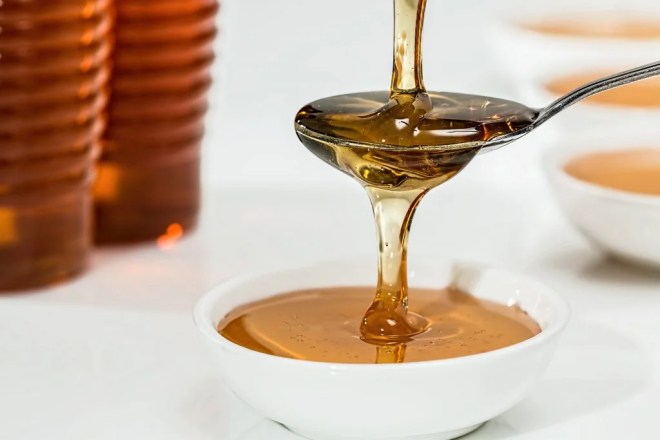300x600

Nowadays,
there are few people who can really enjoy the benefits of natural
honey. Unfortunately, counterfeits abound, which instead of providing
health to our body, harm us, as all artificial foods do.
Natural
honey is one that has not been subjected to any process, unlike
industrial honey, which is pasteurized. Pasteurization prevents
crystallization, but also drastically reduces the quality of the honey,
since in the process most enzymes, antioxidants and other beneficial
properties such as its antibiotic action are annulled.
Honey
has an unusual chemical composition that keeps it fresh indefinitely
without spoiling (as seen in jars recovered from Egyptian tombs). It is
particularly low in humidity and extremely acid, which makes it an
inhospitable territory for bacteria and microorganisms.
On the other hand, bees add an enzyme, glucose oxidase, which creates hydrogen peroxide as a by-product.
The most common composition of honey is:
| Water | 14 – 22% |
| Fructose | 28 – 44% |
| Glucose | 22 – 40% |
| Saccharose | 0,2 – 7% |
| Maltose | 2 – 16% |
| Other Sugars | 0,1 – 8% |
| Proteins and Amino Acids | 0,2 – 2% |
| Vitamins, enzymes, hormones, organic acids and others |
0,5 – 1% |
| Minerals | 0,5 – 1,5% |
| Ashes | 0,2 – 1,0% |

The frequent
minerals in the Natural Honey are: calcium, copper, iron, magnesium,
manganese, zinc, phosphorus and potassium. Also present around half of
the existing amino acids, organic acids (acetic acid, citric acid, among
others) and vitamins of the B complex, vitamin C, D and E.
Honey also has a considerable variety of antioxidants (flavonoids and phenolics).
The color of honey varies between different types
The
color of honey is determined, mainly, by the floral source; however, it
has not been possible to identify exactly which agents are responsible
for imparting the color to the nectar and later to the honey.
Anyways,
it is known that in addition to the minerals obtained from the soil,
pigments of vegetable origin can contribute to the color of honey.
Besides being a food, honey can be used in many ways to benefit our health
Thanks
to its multiple qualities, honey has been used as a medicinal remedy
for millennia, besides having a delicious flavor and used to sweeten all
kinds of foods.
Dr.
Ron Fessenden, a retired physician and chairman of the Committee for
Honey and Health in the United States (a non-profit organization), is an
expert on the physiological benefits of honey. In one of his many
lectures he reported on the properties of honey, such as regulating
blood sugar, reducing metabolic stress and promote sleep recovery.
Natural honey has many benefits for our health, not other types of honey adulterated, mixed or that have been subjected to high temperatures.
Benefits of Natural Honey that you will never find in the fake one
After finding out about some of the benefits that honey gives us, you will no longer have excuses not to include it in your shopping list.Honey regulates blood sugar
It
seems counterintuitive that honey regulates blood sugar. But the secret
of their ability to do so is in the balance of fructose and glucose.
When
honey is consumed, the fructose portion allows glucose to be taken up
by the liver to form glycogen, which becomes available to the brain,
heart, kidneys and red blood cells. This improves the functioning of
essential organs and tissues, eliminating glucose from the circulation
and therefore reducing blood sugar.
Studies
have shown that honey does not increase blood sugar or insulin levels,
producing more glycogen per gram of honey than any other food.
The consumption of natural honey reduces metabolic stress
All stress, whether emotional, psychological or physiological, is translated into the body as metabolic stress.
One
function of the adrenal gland is to produce adrenaline and cortisol,
which stimulates the breakdown of muscle protein into amino acids to
make new sugars. This occurs when the brain thinks it is in danger of
“running out of fuel”, for example when doing physical exercise or
during nighttime sleep.
Natural honey produces glycogen in the liver, which is the reserve of energy needed by the brain for normal functioning.
We
will have sufficient reserves of glycogen if we consume natural honey
at breakfast, before bedtime and at regular intervals throughout the day
(especially before and after exercise). These glycogen stores in the
liver will prevent the release of stress hormones.

Natural honey promotes sleep recovery
If
we consume honey before going to bed, we store glycogen in the liver,
which will supply it to the blood when the brain needs it, preventing it
from triggering the crisis when it detects low levels of glycogen.
In addition, consuming natural honey stimulates nighttime relaxation and sleep.
The
natural sugar contained in honey produces a slight secretion of
insulin, which permits tryptophan to enter the brain more easily and
thus allow the secretion of melatonin, a hormone vital for the daily
regulation of sleep-wake.
Therefore
it is highly recommended to consume a spoonful of honey with a glass of
warm milk (containing tryptophan) before bedtime, to have a good
night’s sleep.
Melatonin also regulates cardiac rhythms, helps improve immunity and facilitates the reconstruction of tissues during the night.
Dr. Fessenden recommends 3 to 5 tablespoons of honey per day, without side effects, risks or negative health consequences.
Honey as a treatment for constipation
Honey
has a high content of fructooligosaccharides (FOS), which although they
have a mainly energetic function, when they reach the colon they behave
in a similar way to vegetable fiber, capturing the water and
increasing the volume of the feces, as well as causing gases that
increase the peristalsis or intestinal mobility. So they exert a mild
laxative effect.

0 Komentar